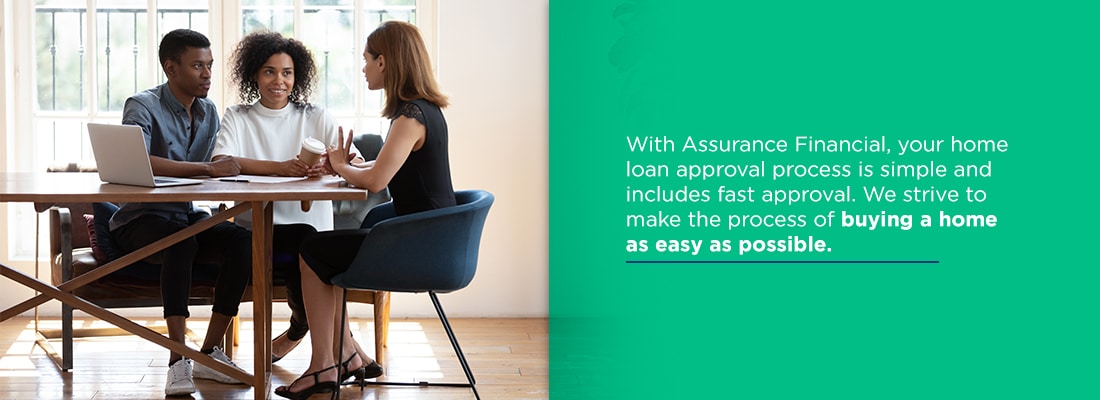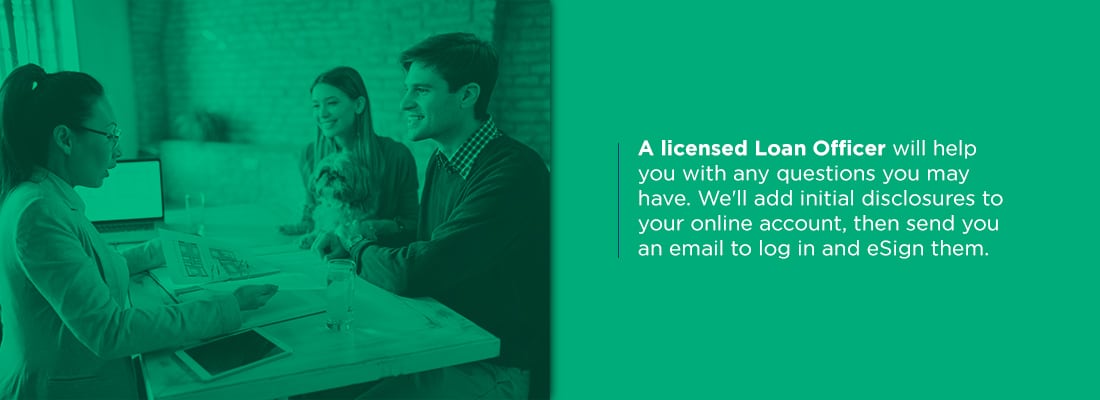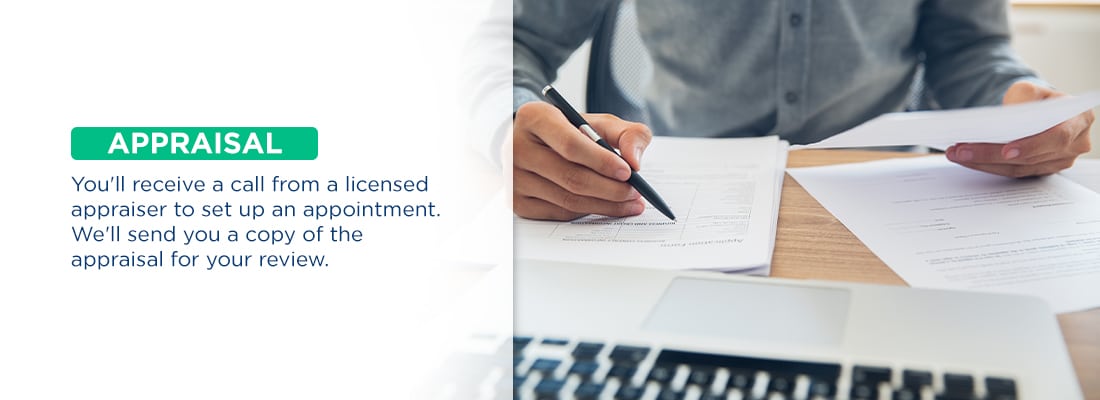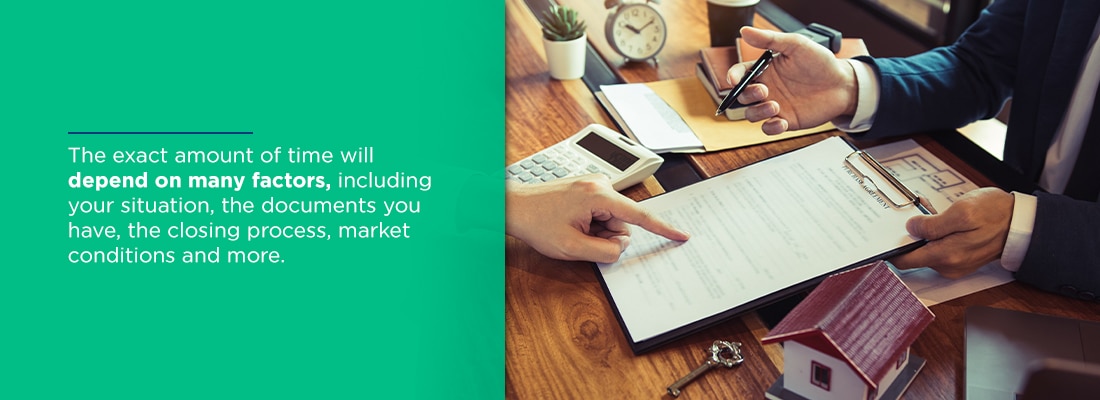Our Loan Application Process Explained
For most Americans, securing a mortgage is an essential part of the homebuying process. The majority of us are unable to afford to pay for a home in cash, so financing may be the only available path to homeownership. If you want to get financing to purchase a home, you will need to go through the home loan process.
This journey begins when you apply for pre-qualification and ends with closing the loan, which means it is funded. Though many homebuyers focus solely on what they’re looking for in a home – the number of bedrooms, the size of the lot, the amenities – you may also want to make a list of what you want from your mortgage, such as the interest rate and the length of the loan.
Learn more below about how to begin the loan application process with us at Assurance Financial.
Table of Contents
- Assurance Financial Application Process
- What to Expect When You Apply for a Home Loan
- Understanding Our Loan Application Process
- When Should I Apply?
- Timeline Expectation
- Learn More About the Loan Approval Process
Our Loan Application Process at Assurance Financial
With Assurance Financial, your home loan approval process is simple and includes fast approval. We strive to make the process of buying a home as easy as possible. You can always contact a local loan officer, or get started online to get a rate quote.
Since we handle underwriting and all of the process steps in-house instead of outsourcing, we are in a position to have better control of the mortgage loan process. We consider ourselves the “people people”, so we’re always there for you when you need us.
What to Expect When You Apply for a Home Loan
Applying for a home loan is a process with many steps. No two mortgage situations are the same and this means the steps of the process can vary, depending on the loan type, terms, borrower, credit scores, property type, market conditions, and other factors.
In general, the approval of a mortgage is based on your ability to repay the loan and the value of the property. You can expect paperwork and questions. You can also generally expect requests for financial details, paperwork, and files. Luckily, with Assurance Financial’s advanced technology, you can easily apply online in about 15 minutes by connecting to your major financial institutions to pull your asset information.
Understanding Our Loan Application Process Steps
At Assurance Financial, we work to make the process transparent. While every mortgage journey is slightly different, you can generally expect these steps when you start an application with Assurance Financial:
1. Apply in 15 Minutes
Complete your online mortgage application as thoroughly as possible. A licensed Loan Officer will help you with any questions you may have. We’ll add initial disclosures to your online account, then send you an email to log in and eSign them.
You must apply for a mortgage in the amount you need. Assurance Financial offers a free pre-qualification process that can help you speed up the mortgage application process and may help you negotiate with sellers. While you do not have to get pre-qualified first, if you are looking for a home, it can be helpful to go through this process so you understand how much home you can afford.
Once Assurance Financial has your financial details, the team can evaluate whether you qualify. The pre-qualification process takes just 15 minutes, during which we will pull and input your credit score and quote a rate. At this stage, you may also discuss which loan is right for you with your mortgage lender.
- Fixed-rate mortgage: You may want to consider a fixed-rate mortgage if you plan on remaining in your home for seven years or more and you do not want your monthly payments to increase. Fixed-rate mortgages have terms of 15 years to 30 years and your monthly payments and interest will remain constant.
- Adjustable-rate mortgage: Adjustable-rate mortgages (ARMs) last for 15 to 30 years and the interest rate and mortgage payment may change over those years. This may be the right home loan for you if you expect your income to increase or if you plan on remaining in your home for no more than five years.
2. Processing
Relax – you’re set for now! We’ll let you know if we need anything. We’ll set up all title requirements with one of our title partners. Expect document requests and questions at this stage, as all the information associated with your mortgage application will be under scrutiny. If you respond promptly to requests, you can ensure that the process keeps moving forward.
3. Appraisal
We will order an appraisal for your property. You’ll receive a call from a licensed appraiser to set up an appointment. We’ll send you a copy of the appraisal for your review. This may take a few weeks, but we will continue to move forward. Sometimes a refinance does not require an appraisal. We’ll let you know upfront if you need one.
4. Underwriting
At this stage, your loan is moving forward to underwriting for review. This is where we determine if all requirements for a mortgage meet pre-determined guidelines. An underwriter examines your risk, credit, and collateral as they relate to the mortgage. Based on these elements, the underwriter will decide whether to approve or deny the application. We may be ready to provide a decision on your loan soon.
If the mortgage is accepted, the lender and borrower can move towards the next step of the process. If the mortgage is denied, it is possible the borrower can take some steps to get accepted for a home loan.
5. Conditional Approval
After Assurance Financial has gathered the needed information, including the borrower’s income, credit check, property appraisal, asset evaluation, and other documentation, the approval process can begin. You may receive document requests and be asked to supply additional material, too. In general, Assurance Financial and other lenders look at the value of the property and your ability to repay when making the approval decision.
We’ll let you know if your loan is approved. We may have some final requests for you from the underwriting team, which you’ll need to submit ASAP. We want to make sure your rate stays locked!
6. Clear to Close
We’ll send you the good news once all the requirements have been met and you’re clear to close! We’ll send closing disclosures to your online account for you to sign. We’ll have the title company call you to set a time for closing.
At this point, compare your closing disclosures with your loan estimate to determine whether any of the quoted numbers or fees have changed. If you notice changes, ask for an explanation.
7. E-Sign Documents
We will send you most of the closing documents to sign digitally before the final closing day, if applicable in your area. On closing day, you’ll meet with the title company in person for just a few final signatures in front of a notary or attorney. Before signing, confirm the paperwork reflects the terms and rates you agreed to.
At this stage, you may need to show you have a homeowner’s insurance policy and you may need to pay closing costs. Once all the paperwork is done and the closing costs are paid, the loan will usually close soon after.
8. Congratulations!
You have a new mortgage! We’ll receive your final documents and send the details for making payments as soon as we have the information. You will get a survey to rate your experience. We love providing you 5-star service!
Now it’s time to move into your dream home!
When Should I Apply for a Mortgage?
If you want to become a homeowner, you may be wondering when may be the right time for you to apply for a home loan. Though the right time is different for every homebuyer, a few factors may influence your timing, such as your credit score, income, savings, debt-to-income ratio, and the market conditions. Consider the following circumstances to determine whether now is the right time for you to apply.
You Have Enough Savings
There are some upfront costs associated with home buying you may want to have savings for before you start your application. If you want a conventional mortgage, you may want to save up 20% of the purchase price for a home in your budget. For example, if you want to buy a $150,000 house, you may want to save $30,000.
Of course, you can still qualify for a mortgage without a full 20% down payment, especially if you are eligible for a Federal Housing Administration (FHA) loan, Veterans Affairs (VA) loan or United States Department of Agriculture (USDA) loan. If you want a conventional loan with a smaller down payment, keep in mind that your monthly mortgage payment will be larger since you will need to take out a greater loan amount. With less than 20% down, you also may need to pay private mortgage insurance.
Along with the down payment, you may also want to consider saving for closing costs and home repairs. Often, closing costs can run a few thousand dollars. Depending on the type of home you want to buy, you may want to save up for repairs you know you’ll want to make when you move in or repairs that will be necessary in the future.
Your lender can help you figure out exactly how much money you will need to have on closing day so that you’ll be prepared ahead of time.
You Have a Reliable Income
Most lenders want to see proof of a stable income and steady employment history from a borrower. As such, you may have to supply recent tax returns, pay stubs, and account balances. Your lender will likely want to see that you have been working for the same employer for a minimum of two years, or they will want to see your most recent two years of income if you are self-employed.
How much home you can afford will also be influenced by your income, as many lenders want your total mortgage payment to fall between 25% and 28% of your gross monthly income. This payment includes your principal, interest, homeowners insurance, private mortgage insurance, and taxes. If you earn $4,000 a month, a total mortgage payment between $1,000 and $1,120 may be comfortable for you.
We recommend not switching employers if you’re planning to apply for a mortgage soon, as doing so may impact your employment history in lenders’ eyes.
You Have a Good Credit Score
The higher your credit score, the greater your chances of being approved and getting a favorable rate. To determine your eligibility, a lender will pull your FICO score from each of the credit reporting agencies. A credit score can range between 300 and 850, so the closer your score is to 850, the better your loan terms are likely to be.
Below are some examples of how certain credit score ranges may be viewed by lenders:
- Excellent credit: Scores above 800 are viewed as excellent credit and can often get you the most favorable rates and terms available.
- Very good credit: Scores between 740 and 799 are considered very good credit. In this credit range, you are more likely to obtain favorable terms and rates.
- Good and fair credit: Anything from 580 to 669 is generally considered fair, while scores between 670 and 739 are good. If your credit is fair, it may be a bit trickier to find favorable rates, but there are options available.
- Poor credit: Scores below 580 are considered poor credit, and if your score falls within this range, you may not qualify for low rates and favorable terms or you may be denied a mortgage altogether.
Fortunately, even if you don’t have great credit right now, there are steps you can take to improve your score, such as making on-time payments and paying down debt. You may also be eligible for loan types that accept lower credit scores, such as an FHA loan or VA loan.
You Have a Low Debt-to-Income Ratio
Most lenders are looking for a debt-to-income ratio below 43%. This ratio compares your liabilities to how much money you make each month. Liabilities may include:
- Auto loan
- Credit card debt
- Student loan debt
- Personal loan
- Boat loan
- Home equity line of credit (HELOC) debt
For example, if you earn $4,000 a month, and you have a monthly credit card payment of $100, a student loan payment of $200, an auto loan payment of $200 and you are interested in a home with a monthly payment of $1,000 a month, your total debt would be $1,500 and your debt-to-income ratio would be 37.5%.
If you plan to apply for a mortgage soon, you may not want to take on new debts. Instead, focus on paying down your current debts so you can improve your debt-to-income ratio and credit score.
You Are Purchasing in a Market With Favorable Conditions
If rates have recently dropped, it may be the optimal time to apply for a mortgage. You may also want to consult with a real estate agent about the state of the market — is it a buyer’s market or a seller’s market? In a seller’s market, if you don’t have a home to sell, it may not be the right time for you to buy.
You may also want to time your application according to the seasons. For example, it may be better to apply for a mortgage in the winter rather than during the summer. Historically, in December, January and February, rates may be lower than in the months between June and October. Summer and early fall tend to have the highest rates, as this is the time of year when most homebuyers are looking for properties.
Timeline Expectations for Home Loan Approval
If you need financing for your dream home, it can take about a month and a half or more to close on a mortgage. The exact amount of time will depend on many factors, including your situation, the documents you have, the closing process, market conditions, and more.
For example, some seasons may see a greater volume of buyers than others, which could slow the process down. Many Americans are looking to move in the summer before school starts in the fall, so if you want to finance a home in the summer, your wait might be a bit longer.
The timeline can also be impacted by the location of your future home. If you are buying a home in a rural area, for example, you may wait longer for an appraisal, as there may be fewer appraisers in your area and travel requirements for the appraiser may be greater, which can affect scheduling.
To get a more accurate timeline for your home loan approval and funding, speak with your lender. However, keep in mind that the timeline will still only be an estimate.
Learn More About the Loan Approval Process
Assurance Financial has been a leading lender for over 20 years. We serve homebuyers a little differently — our full-service team works in-house, offering you complete end-to-end service to save you time. We are approved as a Fannie Mae, Freddie Mac, and Ginnie Mae servicer. We are growing all the time, adding new state licenses throughout the nation. Currently, we are licensed in more than 40 states and housed in more than 20 locations.
Our team combines superior customer service with technology-focused solutions to give you a simple, stress-free homebuying experience that exceeds your expectations. We offer the following mortgage loan types:
- Conventional loans: A conventional loan is one of the most popular mortgage loan types and can be a great option if you have a stable income, good credit and savings for a down payment. You can finance various types of properties, and with a 20% down payment, you can eliminate mortgage insurance.
- Construction loans: Our construction loans offer competitive rates and fees and flexible draw schedules, along with extended lock protection and up to 95% financing depending on the appraised value.
- Jumbo loans: In some cases, you need more money than you can get from a conventional loan. If your dream home costs more than $500,000 or you are buying in an expensive market, you may want to apply for a jumbo loan that lets you finance beyond the conforming limits.
- Refinancing: When rates drop, it may be a good time to refinance. Refinancing can allow you to reduce your monthly payments, eliminate private mortgage insurance, pay off your mortgage faster, consolidate debt, or you can utilize the equity you have in your home as cash for renovations or other expenses.
- FHA loans: FHA loans are popular among first-time homebuyers who may lack credit and a large down payment. With an FHA loan, you can get a home with just 3.5% down with a lower credit score.
- VA loans: If you are a veteran, active military member, or an eligible family member, you may want to apply for a VA loan. With this type of loan, you can have no down payment, limitations on closing costs, no pre-payment penalties, and no monthly mortgage insurance.
- USDA loan: A USDA loan can be a great option if your dream home is located in a rural or suburban area, and you have a low or moderate income. With a USDA, you do not need a down payment or a perfect credit score.
- Second mortgages: A second mortgage is taken out after you already have a mortgage. These mortgages are usually used for consolidating debt, financing home improvements, or avoiding paying mortgage insurance on the first mortgage. Typically, second mortgages have terms up to 20 years and may be as short as a single year.
If you have questions, contact a local Assurance Financial loan officer to speak to one of our experts who work to make the process easier for you.
Linked Sources
- https://assurancemortgage.com/why-get-pre-qualified-before-looking-for-home/
- https://assurancemortgage.com/find-a-loan-officer/
- https://assurancemortgage.com/what-is-considered-a-good-mortgage-rate/
- https://assurancemortgage.com/finding-right-mortgage-loan-for-you/
- https://assurancemortgage.com/15-year-fixed-mortgage-rate/
- https://assurancemortgage.com/everything-you-need-to-know-about-30-year-fixed-rate-mortgages/
- https://assurancemortgage.com/when-is-the-best-time-to-apply-for-a-mortgage/
- https://assurancemortgage.com/conventional-loans/
- https://assurancemortgage.com/construction-loans/
- https://assurancemortgage.com/about-us/
- https://assurancemortgage.com/jumbo-loans/
- https://assurancemortgage.com/refinance-your-home/
- https://assurancemortgage.com/fha-loans/
- https://assurancemortgage.com/va-loans/
- https://assurancemortgage.com/usda-loans/
- https://assurancemortgage.com/second-property-mortgages/
- https://assurancemortgage.com/contact-us/










